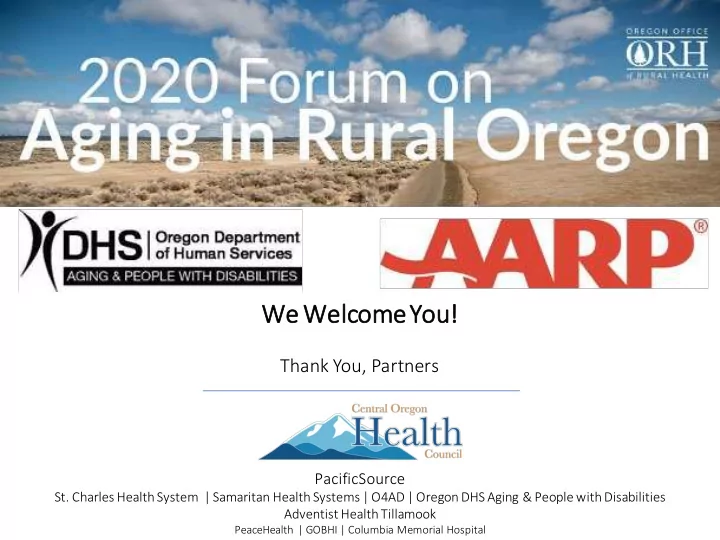

We W Welcome Y You! Thank You, Partners PacificSource St. Charles Health System | Samaritan Health Systems | O4AD | Oregon DHS Aging & People with Disabilities Adventist Health Tillamook PeaceHealth | GOBHI | Columbia Memorial Hospital
• Audio and video are muted for all participants. • By selecting the Q & A and Chat features will populate to your right. Please ask questions using the Q&A featured and use the chat function for everything else. • Our moderator will read questions to the speakers at the end. • Presentation slides will be posted at: https://www.ohsu.edu/oregon-office-of-rural- health/forum-aging-rural-oregon, and recordings will be posted shortly after the session.
Presents, Scams & Financial Exploitation Targeting Rural & Frontier Elders Billie M McNeely-Johns nston, n, Adul Adult P Protective S Services—DHS HS Carmel el P Per erez ez S Snyder, A AARP O Oreg egon, F Fraud W Watch N Net etwork
Detecting and Preventing Financial Exploitation A Closer Look for Rural Oregon
Projected Growth of Oregon Seniors Predicted number of seniors in Oregon Projected growth of Oregon’s senior population from 2012 to 2030 is 175% Source: The Oregon Office of Economic Analysis
Is There a Wolf at the Door?
A closer look at perpetrators FINANCIAL EXPLOITATION
Who Reports? • Anonymous 3% • Attorney 1% • Friend/Neighbor 9% • Health Care 4% • Home Health 3% • Hospital 2% • LEA 7% • Mental Health 1% • Physician 1% • Public Official 1% • Social Services 6%
Scams
Why Does This Matter? Retirement Savings Lost: Average US Victim Loses $120,000 Average Retirement Savings at 50 $108,000
Contact out of the blue Claim of emergency Requests personal information 6 Signs It’s a Scam Requires payment in gift cards or wiring “Shhhhh….It’s a secret” If it sounds too good to be true….
It’s An • May be afraid to tell what happened Under- • Might not understand what reported happened Problem • Might not be able to verbalize what happened • Ashamed that a family member mistreated them • Don’t think police or social agencies can really help
Why is it not being reported? • 34%- dealt with in another way or considered it a personal matter • 18%-Not important enough to report • 16%-Police couldn’t/wouldn’t help • 13%-Fear of reprisal or getting the victim in trouble • 18%-”Other” (Non-reporting to police in rural areas per Bureau of Justice Statistics)
• Cognitive Impairment • Serious or multiple medical problems • Substance abuse • Depressed • Bereaved • Lonely • Isolated • Overly trusting • Paranoid/fearful Vulnerability of theVictim
• Victim and Perp have an ongoing relationship • Perp may groom the victim • Perp isolates the victim and creates dependency • Perp imposes his/her will on the victim • Perp convinces the victim that he/she is not able to function Similarities to alone Domestic Violence
Testing Contact tracing COVID Stimulus check overpayment Specific Scams Pet adoption scams False products SSA reboot
• Resources! Resources! Resources! • Accessibility of resources • Inadequacies of existing health care treatment • Inadequacies of support systems for caregivers • Minorities/ESL Let’s Talk Rural Problems
Reporting Issues in Rural Areas • May be acquainted/known to law enforcement, healthcare professionals and other reporters • May think they will not be taken seriously • Confidentiality might not be maintained • Reputations will be damaged • They don’t want to make it worse
Tribal Specific Issue Judicial authority for crimes of abuse by non- tribal people on tribal lands has been historically limited .
Financial Institutions Lose Too!
• Authorizes financial institutions to refuse certain financial transactions when they reasonably believe financial exploitation of a “vulnerable person” may have occurred, may have been attempted or is being attempted. HB2622
When to Use? • When a financial institution reasonably believes or has received information from DHS, LEA, or a District Attorney’s Office o It must be a reasonable belief • Financial exploitation of a vulnerable person • May have occurred, may have been attempted, or is being attempted • AND pending an investigation by a financial institution, DHS, LEA, or a District Attorney’s Office, a financial institution MAY
Hold……….. • Refuse a transaction with or involving the vulnerable person • Refuse to permit the withdrawal or disbursement of funds in the account • Prevent a change in ownership of the account • Prevent a transfer of funds from the vulnerable persons account to an account wholly or partially by another • Refuse to comply with instructions given to the financial institution by a POA signed or purported to have been signed by the vulnerable person
Consumer Protection/DOJ
AARP Fraud Watch Network • Sign up for fraud alerts • Scam Tracking Map: shows scams in your area • Tips and Resources • The Perfect Scam Podcast • Watch Dog Wednesday • AARP Helpline: 1-877-908-3360 • www.aarp.org/fraudwatchnetwork
AARP Scam Tracking Map
Slam the Scam • Do not give out your Medicare number • Social Security benefits are still being paid • U.S. census will never ask for your full Social Security number, bank account or credit card information • Ensure that you have strong passwords • The IRS will not call you, text you or email you • Be wary of phone calls, or emails • Ignore online offers for coronavirus vaccinations
Where to report Elder Abuse? Reporting Hotline: 1-855-503-SAFE Or DHS Branch Offices: http://www.oregon.gov/dhs/spwpd/pages/offices.aspx AARP Fraud Watch Helpline: 1-977-908-3360
Other Resources • Oregon Bankers Association Toolkit https://www.oregonbankers.com/preventing-elder-financial-exploitation- toolkit.html • American Bankers Association (ABA) Safe Banking for Seniors https://www.aba.com/Engagement/Pages/safe-banking-for-seniors.aspx • Protecting Seniors: A Resource Guide for Partnering with Law Enforcement and Adult Protective Services https://www.aba.com/Engagement/Documents/Protecting-Seniors-Partnership- Guide.pdf • Consumer Financial Protection Bureau Resource’s Guide for Elder Financial Exploitation Prevention & Response Networks https://files.consumerfinance.gov/f/documents/082016_cfpb_Network_Resourc e_Guide.pdf • AARP Watch Dog Handbook – Spanish https://aarpsharex.sharepoint.com/sites/infonet/CSN/e_and_o/Documents/6624 01%20FWN%20Watchdog%20Handbook%20SPA%201-2019.pdf
Contact: Department of Human Services, Aging and People with Disabilities Phone: 503 689-3869 Billie McNeely, State Financial Exploitation Specialist Email: billie.mcneely@dhsoha.state.or.us AARP Oregon, Fraud Watch Network Phone: 541-525-8123 Carmel Perez Snyder, Director, Outreach & Education Email: csnyder@aarp.org
Recommend
More recommend